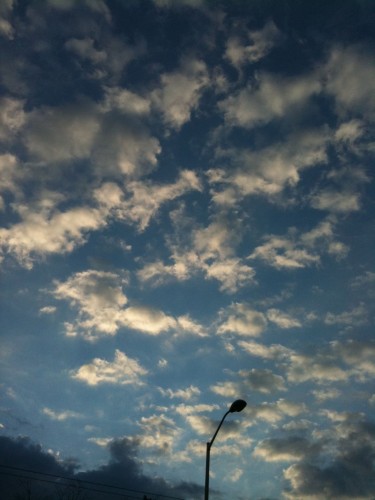My mother and I went to hear Mary Oliver read last night. She read in the chapel at Wellesley College, which was full to capacity – hundreds of people, standing room only. Katrina had described Mary Oliver as “elfin” to me and she is. Tiny and sparkling at the same time, wearing plain black, she commanded the entire room from her spot at the front of the room. The crowd was spellbound, mostly silent, but occasionally breaking into murmurs of emotion, particularly at familiar poems like Wild Geese.
The silence in the chapel had a tangible quality to it, like reverence, or grace. Through the window behind me I could see the sunset, and I kept looking back, watching the sky grow more and more glowingly pink, sliced as it was into small pieces by the dark-wood-detailed window panes. It was the kind of sky that I recently told a friend makes me believe in God, where the clouds are lit from beyond the horizon, by beams from a world beyond the curve of the one we live in.
Watching the incandescent world, the fall leaves blotted against the sky, alive with beauty, and hearing Mary Oliver read her words about ways that holiness inhabits the natural world, I felt something substantial settle deep inside me and something billow to life at the same time. Somebody in the audience asked Oliver what the role of beauty in the world is, and she replied, simply, “Beauty gives you an ache to be worthy of it.” And that was precisely what I was experiencing, right then, with the sunset and the words and the ineffable quality of the silence in that chapel.
Someone else asked her about her childhood, and whether she writes much about it. She laughed briefly, and then said she had not written much about it but planned to. She said, then, that she had not wanted to write about her childhood until she “took true title of her life.” This phrase has been with me for hours: isn’t that what I’m engaged in, here, in some ways? Taking true title of my life, assuming ownership of my experience, growing comfortable asserting my own mastery over my own story?
One other question struck me: asked what physical conditions she writes best in, Oliver said that she writes often outside, always with paper and pen. She said you can’t write poetry on the computer, because when you change a word you need to erase it and write over it. This brought to mind the notion in painting of pentimento, and I wondered how it might operate in poetry: all the words that were thought of before exist, erased but still faintly visible, on the page beneath the final word. What texture this provides to the final verse. Is this true of our lives, too? Do we still have, running through us, all the versions of us that preceded who we are right at this moment? Aren’t we all made up, after all, of layer upon layer of personality, experience, loves, losses, the accumulated detritus of our years on earth?
Oliver read an assortment of poems, some old favorites and many from her new book, Swan. I loved one new of her poems the best. The room rippled with emotion, faint gasps, and wide-eyed wonder as she read the final line. I share the poem in its entirety here.
Whispered Poem
I have been risky in my endeavors,
I have been steadfast in my loves;
Oh Lord, consider these when you judge me.

 “I have just begun to accept the relentless flux that is the condition of my life, of all our lives. Not young, not old; not betrothed, not alone; thinking back, looking forward; not broken, not quite whole anymore, either. But present.”
“I have just begun to accept the relentless flux that is the condition of my life, of all our lives. Not young, not old; not betrothed, not alone; thinking back, looking forward; not broken, not quite whole anymore, either. But present.”